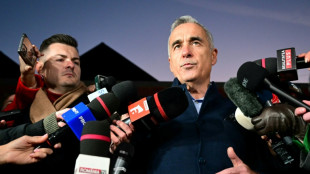
-
 Namibia reopens polls after election chaos in ruling party test
Namibia reopens polls after election chaos in ruling party test
-
Georgia police arrest dozens in clashes with pro-EU protesters

-
 US stocks rise on Black Friday
US stocks rise on Black Friday
-
Leclerc on top for Ferrari in Qatar GP practice

-
 Jihadists, allies enter Syria's second city in lightning assault
Jihadists, allies enter Syria's second city in lightning assault
-
Amorim puts faith in Mount to turn around Man Utd career

-
 Guardiola will not 'run' from Man City rebuild
Guardiola will not 'run' from Man City rebuild
-
Assisted dying campaigners, opponents rally at UK parliament

-
 Durable prop Healy set to carve name in Irish rugby history
Durable prop Healy set to carve name in Irish rugby history
-
Macron unveils Notre Dame after 'impossible' restoration

-
 Traumatised Spain marks one month since catastrophic floods
Traumatised Spain marks one month since catastrophic floods
-
Yen rallies, euro up on rising inflation data

-
 Attack-minded Spurs boss Postecoglou says: 'You'll miss me when I'm gone'
Attack-minded Spurs boss Postecoglou says: 'You'll miss me when I'm gone'
-
Syria jihadists, allies shell major city Aleppo in shock offensive

-
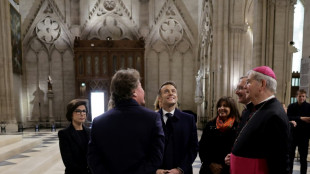 Macron inspects 'sublime' Notre Dame after reconstruction
Macron inspects 'sublime' Notre Dame after reconstruction
-
Arsenal must be near-perfect to catch Liverpool, says Arteta

-
 Arrests, intimidation stoke fear in Pakistan's politics
Arrests, intimidation stoke fear in Pakistan's politics
-
Showdown looms on plastic treaty days before deadline

-
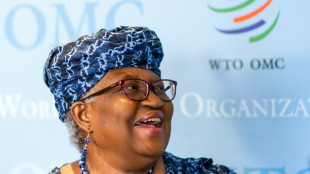 Ngozi Okonjo-Iweala: the WTO's trailblazing motivator
Ngozi Okonjo-Iweala: the WTO's trailblazing motivator
-
WTO chief reappointed as Trump threat looms

-
 US landmine offer to Ukraine throws treaty into 'crisis': campaign group
US landmine offer to Ukraine throws treaty into 'crisis': campaign group
-
British MPs debate contentious assisted dying law

-
 Macron offers first glimpse of post-fire Notre Dame
Macron offers first glimpse of post-fire Notre Dame
-
Syria jihadists, allies shell Aleppo in shock offensive

-
 Japan government approves $92 bn extra budget
Japan government approves $92 bn extra budget
-
Toll in Syria jihadist-army fighting rises to 242: monitor

-
 UK transport secretary quits in setback for Starmer
UK transport secretary quits in setback for Starmer
-
Days before deadline, plastic treaty draft highlights disagreement
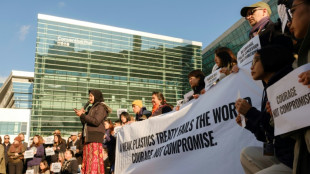
-
 Crypto boss eats banana art he bought for $6.2 million
Crypto boss eats banana art he bought for $6.2 million
-
Teen news boss criticises Australian social media ban

-
 Taiwan detects 41 Chinese military aircraft, ships ahead of Lai US stopover
Taiwan detects 41 Chinese military aircraft, ships ahead of Lai US stopover
-
Spain urged to 'build differently' after deadly floods

-
 WTO chief faces heavy task as Trump threat looms
WTO chief faces heavy task as Trump threat looms
-
Herbert takes control at Australian Open as Smith tanks

-
 Israel PM again warns Iran after top diplomat talks of revising nuclear doctrine
Israel PM again warns Iran after top diplomat talks of revising nuclear doctrine
-
Brilliant Brook's 132 puts England on top against sloppy New Zealand

-
 Brilliant Brook's 132 puts England on top against New Zealand
Brilliant Brook's 132 puts England on top against New Zealand
-
US landmine offer to Ukraine throws global treaty into 'crisis': campaign group

-
 Singapore hangs 4th person in three weeks
Singapore hangs 4th person in three weeks
-
Five things to know about NewJeans' shock split from agency

-
 Waste pickers battle for recognition at plastic treaty talks
Waste pickers battle for recognition at plastic treaty talks
-
Ireland votes in closely fought general election

-
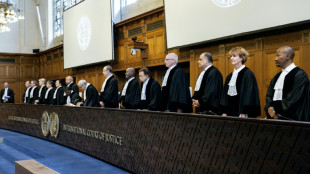 Top UN court to open unprecedented climate hearings
Top UN court to open unprecedented climate hearings
-
European countries that allow assisted dying

-
 British MPs to debate contentious assisted dying law
British MPs to debate contentious assisted dying law
-
Schmidt not expecting hero's welcome on Ireland return

-
 PSG stuck between domestic dominance and Champions League woes
PSG stuck between domestic dominance and Champions League woes
-
'Hot fight' as unbeaten Bayern visit Dortmund fortress

-
 Bordeaux-Begles' Samu 'not finished yet' with Wallabies
Bordeaux-Begles' Samu 'not finished yet' with Wallabies
-
Brook and Pope half-centuries haul England to 174-4 against NZ


How a German war film disarmed Oscar voters despite woes at home
When "All Quiet on the Western Front" first premiered back in September, there was little to suggest it was about to wage an all-out campaign for Oscar votes.
The German-language World War I film comes from Netflix, which had a roster of far more expensive "prestige" movies primed for Academy Award pushes, from Oscar-winning director Alejandro Gonzalez Inarritu's "Bardo" to the star-studded "Glass Onion: A Knives Out Mystery."
But while those have largely fallen by the wayside, with one nomination each, "All Quiet" has emerged from the crowded trenches of awards season hopefuls as an Oscars frontrunner, with nine nods, including for much-coveted best picture honors.
"It really feels like a wave of joy and luck that has come over us," director Edward Berger told AFP, days before his film won seven prizes at Britain's BAFTAs, including best film.
"We're very grateful for that... it's a German war movie!"
Indeed, Berger's film is the third screen adaptation of Erich Maria Remarque's seminal novel about naive young German soldiers confronted with the horrors of war -- but the first shot in the author's native language.
Had he been asked, the director "would have immediately said no" to making another English-language version.
Luckily, the decision to flip the script was helped by Netflix's wildly successful expansion into new global markets with recent subtitled hits such as South Korean series "Squid Game" and Oscar-winning film "Roma."
The movie's eventual $20 million price tag was comparatively small change for the streaming giant, but a huge sum in the German film industry.
"We wouldn't have gotten the type of budget that you need to make this film five years ago," said Berger.
The film's best picture Oscar nomination is the first for any German-language movie.
- Creative license -
Ironically, the film has been far better received outside of the German-speaking world than it has at home, where many reviewers savaged it.
In particular, critics slammed Berger's decision to depart from Remarque's text, which -- with 50 million copies sold worldwide, and the legacy of being banned by the Nazis -- holds hallowed status in Germany today.
Unlike the novel, the film portrays tense armistice peace talks with French generals. It also omits a section in which one of its war-hardened heroes visits home but cannot readjust to civilian life.
"I don't follow it very closely... that's part of the journalist's job -- to observe, criticize," shrugged Berger.
"I felt licensed to make those changes" because "why make it the same?" he added.
To encapsulate the "physical difference" between the film's reception at home and overseas, Berger pointed to one especially harrowing scene towards the end of the movie.
A key character is fatally bayoneted through the back -- a moment which Berger intended to be heartbreaking and brutal, but not necessarily unexpected, given the novel's fame and the war's unfathomable death toll.
Yet at the film's world premiere in Toronto last year, "there was a loud gasp in the audience," he recalled.
"I was so surprised, because I didn't plan on this... In Germany, that didn't happen," said Berger.
"As Germans, we expect -- in a German movie about war -- you cannot have a hero. You cannot have people be successful in the mission. You almost cannot have a soldier survive," he said.
By contrast, "in America, you're used to the hero. You want them to come out positively, and you cling on to the hope that your hero is going to change the world."
- 'Shame and responsibility and guilt' -
In any case, Berger did not sign up out of any sense of patriotic duty. The film and the original anti-war novel are both stridently against jingoism of any stripe.
"We wanted to make a very German movie -- but we are not making it for the country," he said.
"I'm not a patriot. Germans have a difficult relationship with patriotism, or pride or honor, about their history or country. So I'm not in that business."
Instead, filming in German offered "an outer stamp of authenticity" and a deeper sense of the "shame and responsibility and guilt" many Germans feel about history, said Berger.
Whatever happens at the Oscars ceremony on March 12, "All Quiet" clearly left an indelible impact on voters at the US-based Academy of Motion Picture Arts and Sciences.
It is seen as a shoo-in for the best international feature statuette, a strong possibility for best picture, and its nine Oscar nominations are one short of the all-time record for a foreign-language movie.
"Were we surprised? Of course," said Berger. "I mean, you can't count on something like that."
M.Odermatt--BTB


